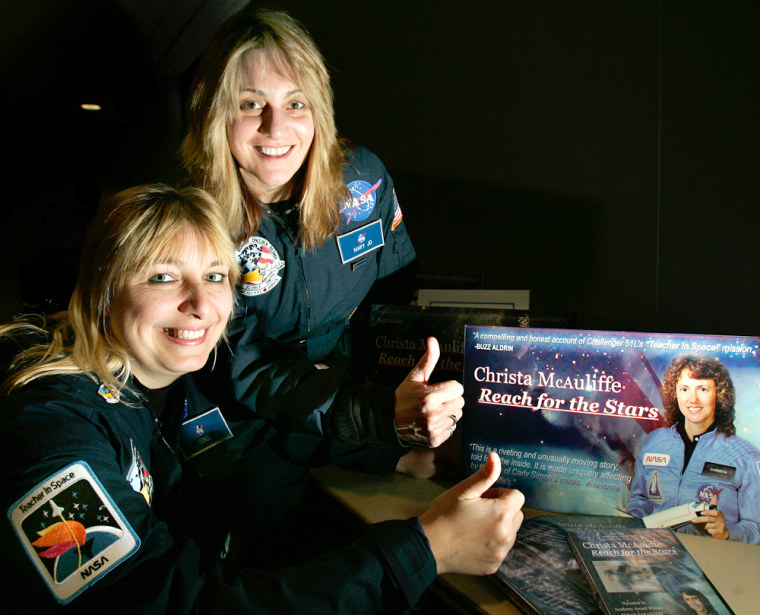The Challenger disaster left an indelible impression on Renee Sotile, who like so many starry-eyed students in 1986 had been captivated by a teacher who was on the crew heading to space.
What stuck with Sotile, then a teenager in Rochester, N.Y., wasn't Christa McAuliffe's very public death along with the six other members of Challenger's crew.
Instead it was memories of McAuliffe's life that endured: a 37-year-old women bubbling with confidence who ventured boldly into a realm that had been largely a man's world. A teacher who had her students read the journals of pioneer women because history textbooks paid too much attention to men.
"I just always wondered what kind of person she was," said Sotile, a former videographer for CNN who had been making short films in Los Angeles with a friend, Mary Jo Godges.
Armed with gumption and bankrolled by credit cards, the pair started shooting a full-length documentary in 2001. It took five years, but they were buoyed by luck, the cooperation of McAuliffe's family and some help from the likes of Carly Simon and Susan Sarandon.
The result is a 75-minute film, "Christa McAuliffe: Reach for the Stars."
"It brought her alive," said McAuliffe's mother, Grace Corrigan, who got an early viewing of the film.
Tuesday night at McAuliffe's alma mater, Framingham State College, Corrigan greeted friends and her daughter's high school, college and NASA classmates. There was an intimate screening with the filmmakers that was part reunion and part memorial.
"This film lets people know who Christa was that never got to meet her," said Bob Veilleux, 62, one of NASA's 114 finalists for the teacher in space program.
Veilleux, who like McAuliffe was a high school teacher in New Hampshire, was at Cape Canaveral watching that January day in 1986.
"I love the portrayal of Christa as a person," he said, wiping tears from his eyes. "She was incredibly charismatic. That's why they chose her."
The showing commemorates the 20th anniversary of the Challenger explosion, which arrives on Saturday. More than that, it is the completion of a journey for Sotile and Godges, who started filming at Framingham State on the 15th anniversary of McAuliffe's death.
The film tries to shed light on why this high school teacher from Concord, N.H., was picked out of the 12,000 educators who applied for President Reagan's teacher in space program. It is a portrait of a dynamic woman whose enthusiasm for learning — and life — was infectious, even coming through on old news footage.
"Reach for it," McAuliffe tells students on video included in the film. "Push yourself as far as you can."
At Concord High School, McAuliffe taught economics, law, American history and "The American Woman," a course she designed.
Beyond the public persona, the film also gives a glimpse of McAuliffe's life before the space program.
"Christa was so much more than an astronaut running around in a blue suit," said Margaret Gilmore, 55, a high school classmate in Framingham.
The crowd Tuesday night gushed at the documentary's intimate details, such McAuliffe's baby pictures, to her wedding dress, to images of her own two children, who were 6 and 9 when she died.
The crowd laughed knowingly when one McAuliffe's students recalled that she had a penchant for running into class late, her hair still wet from the shower. A friend remembered that McAuliffe wore a strapless dress, for example, to her high school prom, a scandal at her Catholic school in 1966.
And here in Framingham, where McAuliffe grew up, her old neighbors still covered their eyes when the fateful explosion covered the screen.
For Sotile and Godges, who watched from the back of the room, the documentary was a challenge despite the richness of the subject. They had never made a film longer than 10 minutes.
"This was a big story that needed to be told," said Godges. "But there were plenty of times when it felt like Renee and I were the only ones who felt like that."
They were turned down for grants, rejected by funders and their personal credit cards neared their limits.
Then Carly Simon called.
Sotile had written her a letter explaining that McAuliffe had carried a cassette of Simon's music to space because it soothed her. Simon asked about the project, pushed for some narrative details and wrote a song titled "You're Where I Go" for the film.
Other things started to fall into place. At a film festival in Harlem, Sotile and Godges bumped into actress Susan Sarandon and told her about their project. Sarandon agreed on the spot to narrate the documentary for free.
In the end, Sotile and Godges condensed interviews from about 40 people, amassing 75 hours of new footage.
In large part, however, old footage lets McAuliffe speak for herself.
"I touch the future. I teach," McAuliffe said during an interview in the film. "I really appreciate that sentiment. That's going with me."
